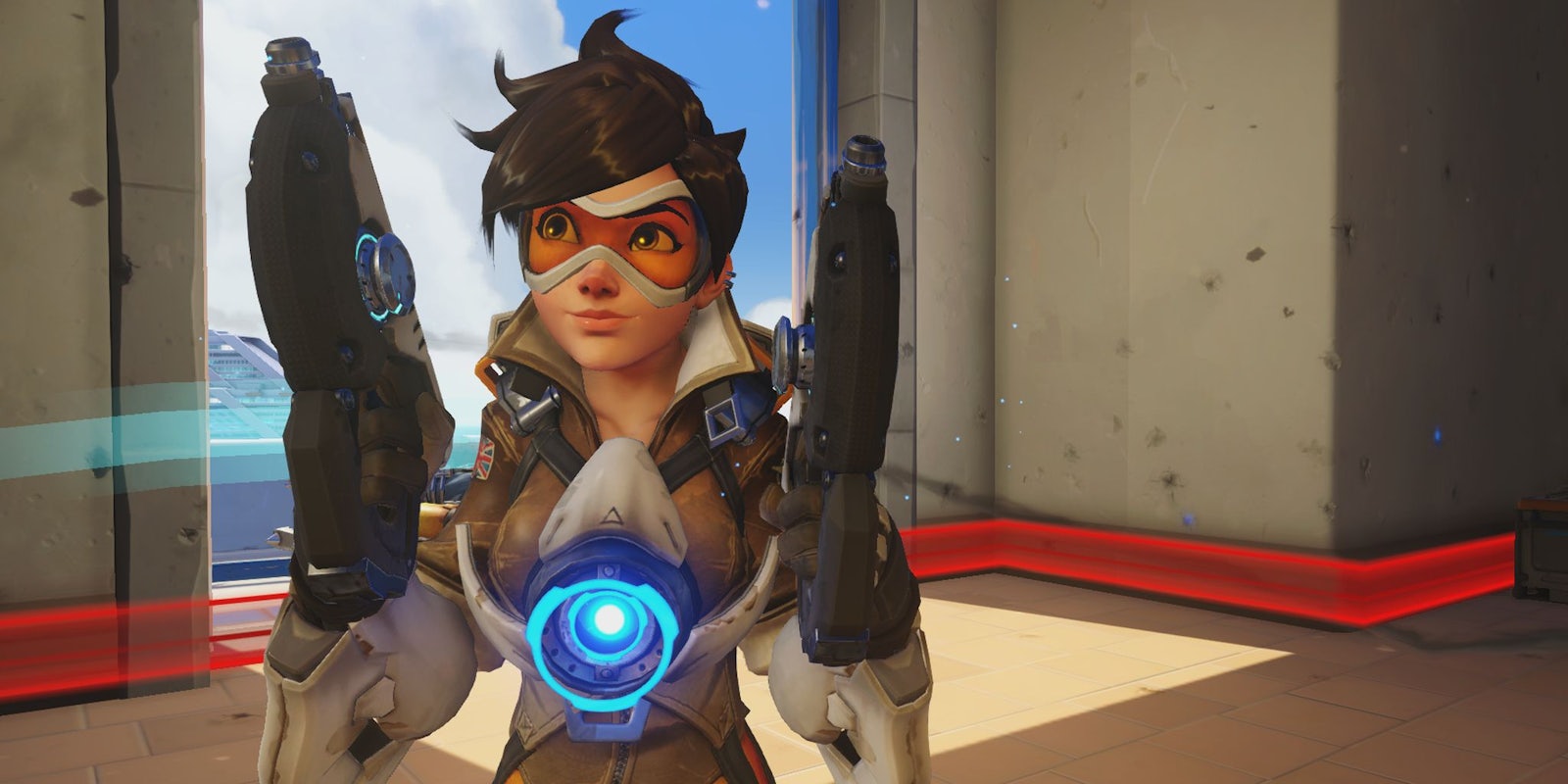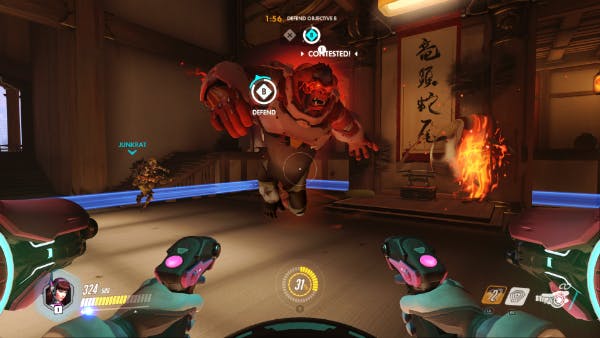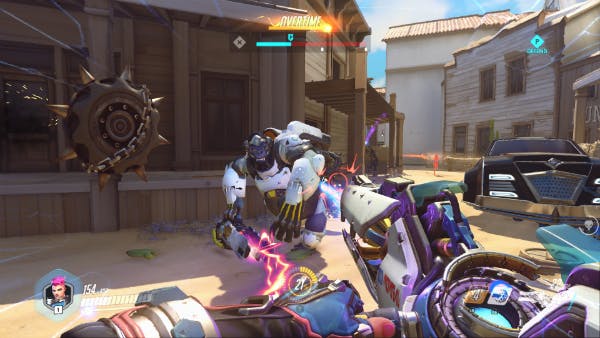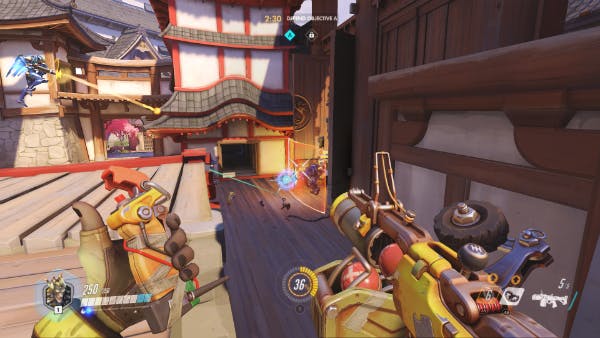Blizzard at PAX East 2016 debuted to the public the console version of its new team-based hero shooter Overwatch, which has been in closed beta on PC for several months.
PAX East attendees stood in line for hours to play either the PlayStation 4 or Xbox One versions of the game, and gave Blizzard its first dose of raw console feedback. Judging from the consistent size of the lines for Overwatch during the three days of last week’s convention, expectation for the game’s console version is high.
Blizzard is largely defined as a PC developer. You have to go back as far as the early 1990s to classic games such as The Lost Vikings and Rock n’ Roll Racing on the Super Nintendo Entertainment System to find Blizzard games designed exclusively for consoles.
Diablo III, originally released in May 2012 as a PC exclusive, did eventually make it to the PlayStation 3 and Xbox 360 in September 2013, and to the PlayStation 4 and Xbox One in August 2014; but these were appreciably modified versions of the PC game featuring an entirely different camera perspective and an altered system for how the player encountered groups of enemies.
Overwatch, on the other hand, is being developed as a simultaneous release for PC and both the PlayStation 4 and Xbox One, an oddity in Blizzard’s history. We spoke at PAX East with Overwatch’s Assistant Game Director Aaron Keller about how simultaneous development has affected Blizzard’s process, and what unique challenges it’s presented for the company.
How do you adapt to the different mentalities of PC gamers, and console gamers, when you’re developing a game that from the get-go is on all three platforms?
(Everyone may not agree with that, that they’re different audiences. I’m a PC gamer, and a console gamer, and in my experience console gamers are less willing to put up with things, and have a shorter attention span.)
So how do you change the way you think about development when you’re going for these two different audiences?
I don’t know if I specifically disagree. I like playing games on both platforms, as well, although I definitely have favorites on one or the other.
I think that with Overwatch in particular, from the very beginning we wanted it to be a game not just for the PC but for consoles as well. I have a limited console background. I worked on console games a long time ago, for the PlayStation 1, and so it was definitely a learning experience across the team where there are different things that we have to think about.
But since we were doing it from the beginning, every developer had a console controller on their desk from the start of the project, and so we always wanted to make sure the game felt just as good on the console as it did on the PC. And I think that the controls actually translated really well.
Our heroes are pretty simple. The complexity of the game comes through in the interaction between all the heroes, and what happens on the team, but they’ve typically got one to two weapons, two abilities, and an ultimate ability, and it maps really well to the controller.
And then we’ve also done some small changes, like we always depict different fields of view, we have aim assist on the controller for the console, and little things like that. The thing that’s surprising is there’s almost no tuning differences between the two platforms at all. The game just works on both of them.
I imagine you’re doing some internal console testing. Are you getting different kinds of feedback?
There is a little bit of feedback that’s different, but we’ve been playing on the consoles, like actual console builds in-house for a long time, for over a year. It’s remarkable that the game plays very similarly between the two platforms. And so you might have different strategies with the way you play some of the characters, but at its heart we haven’t changed the game.
So you don’t need separate balance between the two platforms? I heard there was a console event where Tracer was likely too good, because on the console controller you can’t actually spin around and aim to hit her when she blinks.
I think some of it depends on the skill level of some of the console players. If everyone’s kind of at a mid- to low-level player, it might be difficult for Tracer to be blinking to different sides of you and spinning around at the same time, the same way that it’s hard for you to flip around and hit her.
At the higher levels, console players, it’s remarkable how good they are when they crank the sensitivity on the controller all the way up. It feels like they’re playing PC. And it’s actually shocking because none of these people today have played the console build before. Some of these players out here track better on the console than I do on the PC. It’s remarkable.
Do you have separate balance on the PC and console versions?
We don’t have separate balance. We always thought that one day we would, like are we going to have to make Torbjörn’s turret track slower, or something like that, but it just wasn’t necessary.
If we need to, we are open to it. It’s not like there’s a line in the sand that we’ve drawn. If the community really feels like we need it, or if we change our mind and feel like we need it, we’ll do that.
I’m wondering about the competitive circuit, and whether you imagine there are going to be separate leagues or brackets for PC Overwatch and console Overwatch.
It’s a good question. One of the cool things that’s happened in the beta is a big competitive scene has started developing—and it’s obviously on the PC because it’s the only thing people can play—and there are almost daily tournaments being run for Overwatch. And it’s cool because the designers can watch every single one of them, we can make changes to heroes based off of it.
So I’m kind of excited to see what happens once the console is open beta, once the console’s released, to see if we start getting that same sort of momentum on the console side. It would be really cool to see what the community does.
And as far as Blizzard-sponsored stuff, like whether it’s Blizzard-sponsored tournaments, or other esports things, we all feel like the game has a lot of potential on the esports side, and we’re just now finalizing what our plans are going to be for all of that, so announcements will be coming soon of what it is, but I can’t really go into details now.
We’re seeing now, on console, the development of several games that are based on heroes, right? We have Battleborn, it’s a “hero shooter.” Overwatch is similar in that you have a selection of characters that you really are going to need to get to know.
For a PC gamer, yeah, they’re used to sinking a lot of time and energy into really getting to know a game, like MOBAs. For console gamers, games are a little more disposable. Do you think you’re going to see the same sort of longevity of interest in Overwatch from console gamers that you’re probably going to see from PC gamers?
I disagree a little bit on the longevity side. I know people that are into console shooters like Call of Duty or Destiny, and can play them for a long time. Granted, Call of Duty refreshes their lineup once a year so maybe that’s doing some of it. But I think that there could be a lot of longevity to the product.
We’re designing it to where we want you to play this game for years, we’re going to be updating it for a long time to come, and I hope that the people that do enjoy playing console games for long periods of time do that with Overwatch, because at that point, once you start learning some of the heroes, we have 21 heroes across the game.
It can be a lot to take in, but it’s also really exciting to learn all of them. And once you do, the game becomes kind of—it’s all this magical set of gameplay—because you have all this freedom to play any way you want to, and counter the other team any way you want to.
How about pushing patches? Clearly Battle.net is not going to slow you down on the PC side…
Yeah.
I understand if you want to be delicate about this. I believe Microsoft is better with Xbox One patches than they were with Xbox 360 patches? I think Sony’s usually been pretty good about patches. Is that something you have to think about?
It’s definitely something that we have to think about for the project. Our intent for large patches, especially for content patches, is to have as much parity as possible between all of the platforms. We’d love it if they all came out on the same day.
The good thing about those big patches is they take a while to develop, like if we’re going to release a new hero or a new map there’s usually a lot of lead time there, so something like that is a little bit easier to facilitate. But when you start boiling it all the way down to hotfixes or really small patches where it’s like “Hey, we’ve got a crash bug here and we really got to fix it,” there’s a few different ways to think about it.
One, we have different code bases across the three different platforms that we’re releasing for, so potentially some platforms will be the only one to get a patch. We need to fix a bug on this one, we’re going to do it.
And then other than that, let’s say we need to hotfix, we think that there’s a really bad balance issue, and we need to fix it? We are not going to hold that patch on a platform just because it takes longer to get it on the other ones. For those, we’re going to push them all out as fast as we can, but for the big patches, I just want to reiterate that we’re going to try to push for same day.
You just recently added a competitive matchmaking mode. How do you feel that’s working so far?
The competitive matchmaking mode, it was one of the last, big features that we really wanted to get in before ship. And the way that we’ve treated the beta so far, is that we want everybody in there to give feedback on all of the big features in the game, but we knew that we weren’t going to have enough time to completely finish the feature before we put it out to beta. It’s just, everything’s too tight.
We probably put it out 60 percent finished. And I think that a lot of people in the community really kind of appreciate our transparency, but sometimes people might see a feature that’s not quite as finished as we would like it to be, and they would like it to be, and they have a lot of critical feedback for something like that. At the end of the day I think it’s the right decision for us to make.
We have a lot of people putting a large amount of work and a ton of focus on competitive features, so by the time we actually start a real competitive season, I think it’s going to be at just the right place it needs to be.
Microtransactions are part of the long-term plan for Overwatch. In my experience, console gamers have a much lower tolerance for microtransactions than PC gamers. How does that change your thinking about Overwatch on PC vs. console, if it does?
The way that we want to release content for the game, the big content for the game, that would include new heroes, maps, and skins, is we want all that to be free of charge to players, so when it’s released players will be able to download it and use it immediately.
We think it’s an important game design decision that every hero that’s in the game is accessible to people at all times. We also like the ability for people to be able to play on every map in the game. We don’t want to have to separate players into different buckets and so we want all that to be released.
Every time you level you unlock a loot box. When the game comes out you’ll be able to buy loot boxes as well. But right now that’s our only plan for charging people money in-game. And everything you get in those loot boxes is cosmetic, and can be earned just through gameplay.
Do you think console gamers will embrace that idea?
I don’t know. It’s a good question. I’m not sure. I have a feeling we’ve got people at Blizzard that have crunched a bunch of numbers on it, but I’m not one of those guys.
Samuel Lingle contributed to this report.





